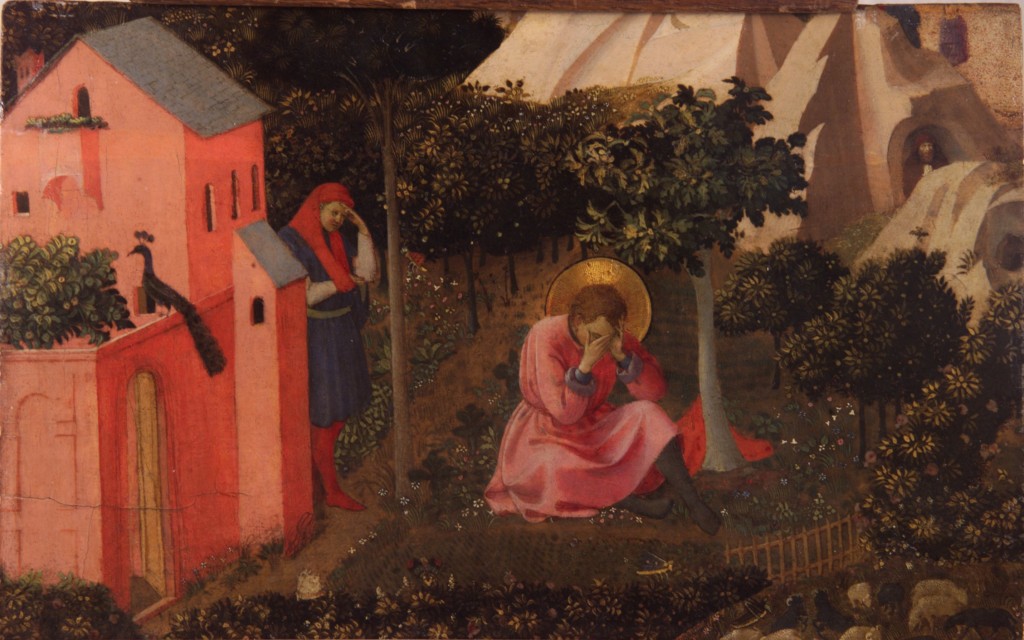
In particular, he’s interested in doing philosophy from the perspective of the poor. That’s what he calls ‘folk phenomenology,’ a philosophical immersion into the perceptive experience of the folk. That’s also what this album is. As a soul, jazz, and blues album, this is the music of the folk, of the racialized, of the poor. (If you want to hear folk music from Sam, check out his EP).
But this album is not only a tribute to the (neo)soul greats on whose shoulders Sam stands. It’s a tribute to Augustine.
Augustine?! some might say, aghast. As one colleague who works on race and religion quipped to me not long ago when I dared to mention the name, Augustine Schmaugustine.
So let me tell you about Augustine and his Confessions.
I first encountered Augustine’s Confessions on my father’s bookshelf. My father, as those who read this blog know, is a Chinese evangelical pastor ordained in the progressive black church. I pulled the book down from the shelf and asked my father whether it was worth my time. He said, ‘Son, you are smarter than I am. I was assigned this book in seminary, but I did not understand it. Maybe you will.’
I was sixteen at the time. I decided to give it a try; after all, the Catholic school I attended had a ten-minute daily ‘sustained silent reading’ time.
I couldn’t get past the first ten pages. It was like nothing I had read before, beautiful theology, yes, and those were the terms I knew to use about Augustine because I didn’t know that Augustine would roll over in his grave if he were called a ‘theologian’ by profession (he was a philosopher). But suddenly, that beautiful theological prose gave way to a nauseating confession that he was a demanding baby who cried a lot. That was annoying. Augustine Schmaugustine.
The next time I heard of Augustine was at the University of British Columbia. I was a history honours student, which meant that my cohort was in a special program where we had lots of seminars, no exams, and about 600 pages of reading a week.
One course I took was called Religion and the Body (with no relation to John Paul II’s theology of the body). It was taught by a historian in the department, Joy Dixon, who specializes in the history of religion and sexuality, particularly around the turn of the twentieth century. I think I learned more in this class that shaped my approach to religious studies than I have in any other class. That’s because in the first class, we had to compare Clifford Geertz’s ‘Religion as a cultural system’ to Robert Orsi’s ‘Snakes alive’: the former had an anthropological account of religion that basically held that it was a symbolic system of induced moods and perceptions, but the latter took seriously the theological imaginations and practices of religious practitioners no matter how distasteful their lived religious practices might seem to the modern gaze. If you read this blog regularly, you can guess into which camp I fall.
And then we read Augustine. To be honest, we didn’t really read the Confessions — we read enough of it and the accompanying literature in order to set up a midterm book report on Leo Steinberg’s Sexuality of Christ in Renaissance Art and in Modern Oblivion. To this day, then, my view of Augustine has been shaped (some may say ‘twisted’) by this approach, as my first impression of Augustine was in fact through an academic article that quoted his Literal Commentary on the Book of Genesis, where Augustine asserts that before the fall, a male erection was voluntary, but after the fall, it became involuntary — and thus irrational, which was a sign of original sin. Having been shaped thus, it disappoints me every time I read the Confessions now that pears, but not erections, are discussed.
The grotesqueness of the previous paragraph has a point. It was around this time that I also encountered the work of Mark Driscoll, for as chance and fate would have it, I happened to be involved in Asian Canadian evangelical circles as well, and that was what was circulating circa 2005 and 2006 — this was in fact prior to the term ‘New Calvinist’ entering the evangelical lexicon, thanks to the work of Collin Hansen. As A Christian Thing’s Chinglican at Table has pointed out, Driscoll made it very apparent that much of his frequent talk about sex had to do with his reading of Catholic tradition as anti-sex:
Driscoll also reads the Tradition’s emphasis on sex as procreative as suggesting that sexual pleasure is gross and sinful, and to wit, he quotes a Canadian Catholic bishops’ statement on chastity and procreative sex as the definitive word from the magisterium that “sex is gross” (Real Marriage, 116). Apparently, he doesn’t have much time for Augustine’s understanding of “concupiscence,” that sin sometimes is when you have too much of a good thing (which is a theme that John of the Cross interestingly carries into The Ascent of Mount Carmel where he says that too much spiritual reading is spiritual gluttony).
In other words, Augustine was seared into Driscoll’s consciousness, and because his materials began circulating in earnest among Asian Canadian evangelical circles at the time, that was another channel by which Augustine’s Confessions circulated to me.
So I decided to read the Confessions. I read it on the bus. I read it at home. I read it on retreats. I annotated it. I picked apart what it was trying to do philosophically. I learned about a guy called Plotinus. I felt sorry for Monica. I discovered that Genesis was actually a pretty important book for Augustine. I finally finished it in a Catholic retreat centre with lots of interfaith trappings because my Chinese Canadian evangelical ‘spiritual grandmother’ wanted to take my friend and me for a undergraduate graduation retreat.
The next time I read the Confessions, I had forsaken the Mark Driscoll ‘New Calvinist’ craze (the term had by then come out) in an effort to experiment with the phenomenon of ‘evangelicals getting high‘ (church). To date, one of the most striking analyses of that ‘evangelicals getting high’ movement has been by a feminist blogger who observes that the hard gender roles prescribed by the New Calvinists often get imported into the practices of those who become Anglican, Catholic, or Orthodox. But these were again the days before this phenomenon had a name, and these were also the days when I began in my academic work to become convinced by feminist geographers that the division between public and private spheres were incredibly gendered.
I read the Confessions then because I was taking an online class on the History of Christianity from Regent College, which is a Christian graduate school on the campus of the University of British Columbia where I was doing my real graduate work. The assignment was to read the Confessions and then wrestle personally with it. I won’t tell you how I wrestled with it — that’s private — but on this reading of the Confessions, I finally felt like I moved past my own ideological blinkers and let Augustine talk to me, even though, because of my increasing feminist commitments, I shuddered every so often at how he would talk about women.
A year went by, and I discovered that in the midst of doing academic work, I needed to take weekly breaks for self care. Enter the Confessions again. I remember taking the book out on a long walk in Steveston (ahem, Storybrooke!), sitting on a bench, and reading the whole thing for some eight straight hours with Brooke Fraser’s album Albertine playing in my headphones. That was a bit of a trip.
Back to Sam Rocha.
By the time I met Sam Rocha, I was a newly minted PhD. A PhD does strange things to oneself. For example, because I researched how Chinese Christians in the Pacific region became so privatized and yet tried to engage the public sphere, I became extremely conscious of geographical processes by which communities come to see themselves as private. Because my research subjects were grappling with complicated issues in sexuality politics, democracy movements, postcolonial agency, and the fuzzy line between ‘religion’ and the ‘secular,’ I had to deal with all of these things too, which meant that my academic work became a source of transformation for me.
All that is to say that when I met Sam Rocha, I discovered that he and I talked the same way. We had the same intuitions about racialization, postcolonialism, democratic participation, secularities, and critical theory, except he was coming at it from a philosophical perspective whereas because of my geographical training under David Ley, I always wanted to get the hard qualitative empirical data through fieldwork, key informant interviews, focus groups, and archival research. I also discovered that Sam was the new hire in philosophy of education at my alma mater, the University of British Columbia.
He then dropped into a conversation that he — the folk phenomenologist — was working on a soul/jazz album on Augustine’s Confessions. My jaw hit the floor.
Read through my account of how I encountered Augustine’s Confessions again. My encounter with Augustine has been a very modern, even elitist, encounter with him — surpassing my Chinese father who couldn’t understand him in seminary, setting up academic theory, reinforcing gender categories, moving on up the liturgical ladder, caring for the interior soul. No wonder my colleague in race and religion said, Augustine Schmaugustine — Augustine is the path to elite advancement as I encountered him, not as the voice of the poor and the racialized.
And here comes Sam Rocha to insist that Augustine speaks soul, jazz, and blues fluently. Coming right to the very university where I encountered Augustine in all these various ways, Sam Rocha’s Late to Love hits me right where it hurts, because he suggests that if we read Augustine to reinforce our racial hierarchies, gender norms, and class privileges, then we have seriously misread Augustine. It’s often quipped that Augustine was himself an African, a claim that scholars of race take as a bit of a farce because he predates the modern invention of the color line. But Sam even intuits this — I don’t think he intends to incorporate it — as he sings, ‘Late / have I loved you / Beauty so old / Beauty so new.’
I sing along. I even dance. It’s because Sam has made me realize that I am very late to love with my twisted readings of St. Augustine. In the words of James Baldwin:
Try to imagine how you would feel if you woke up one morning to find the sun shining and all the stars aflame. You would be frightened because it is out of the order of nature. Any upheaval in the universe is terrifying because it so profoundly attacks one’s sense of one’s own reality. (The Fire Next Time, in Baldwin: Collected Essays, p. 294).
Baldwin wrote this about race in America, about why the possibilities of actions born of love to re-imagine the racial order in America has always stalled.
Come to think of it, everything I have just written is actually about race. Sam would wink at me. He knows that Late to Love is music that is fundamentally about race.
POSTSCRIPT: Because I seldom write so personally on Religion Ethnicity Wired, some may wonder how I came to use this style. It’s Sam Rocha’s fault. If his album is a tribute to St. Augustine, my post is a tribute to Sam’s final talk at Wabash College.












